Steamed eggs and oatmeal: The taste of comfort and regret
When I was a child, I made fun of my mother’s simple cooking. Now, too late, I realise how much care went into it and how it still comforts and sustains me.
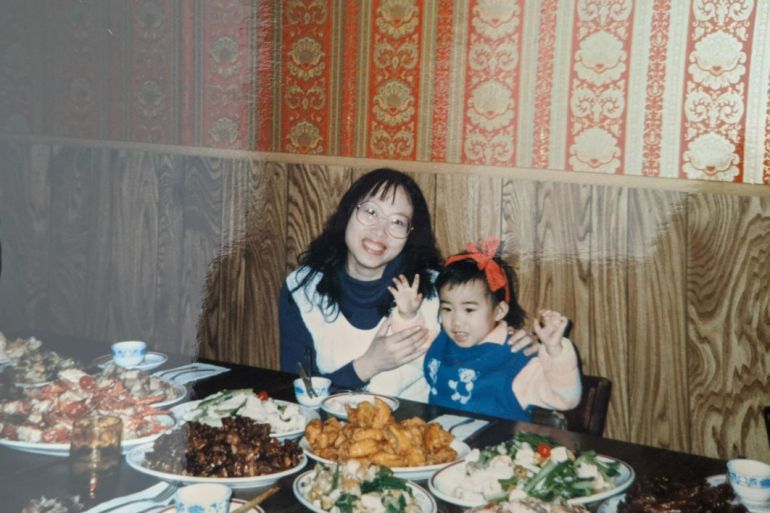
Fork the System is Al Jazeera’s home for all things food. From Syria to Uganda, Bangladesh to Colombia, we look at how food makes us, a forkful at a time, generation after generation.
My mother was not the chef.
Keep reading
list of 4 itemsCinnamon summers: On being Libyan, and British
Meet Abou Cocktail, Idlib’s juice king
Heritage, history, and Dhakaiya food in Bangladesh
Her father was. He left Fuzhou in China first for Hong Kong and then the United States, where he became a cook, chef, and successful restaurateur. I remember his restaurant, Yangtze Kitchen, from my childhood in all its 1980s glory: dark wood-panelled walls in an expansive dining room, wooden carvings of cranes in the archways, and red vinyl booths.
My father was also a chef. He worked for Grandaddy and went on to buy the restaurant from him, streamlining it into the takeout style that was ubiquitous in 1990s Long Island, New York. His ventures followed the standard American Chinese restaurant formula, with Formica counters, a picture menu, a glowing backlit landscape mural, and kids doing homework at the tables up front.
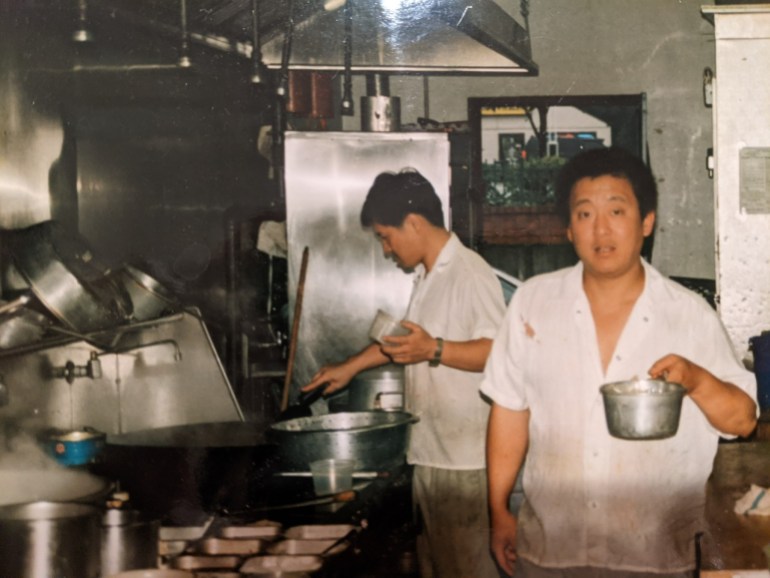
They were both blurs in the kitchen, moving in fluid poetry between prep station and wok range. They thrived among the flames that imbued their food with wok hei, the intangible smokiness that is a signature of skilled Chinese cooking. They chopped with efficient brutality and mixed and blended with businesslike briskness, never a measuring cup nor recipe in sight. My father was – and still is – particularly brilliant at reverse engineering dishes, needing no more than a taste to discern ingredients used and even techniques, informed as he was by his time in a French kitchen in Manhattan.
Then there was my mom.
In the restaurant we owned and worked in, her wok skills were nominal. She lacked the strength to flip the wok, and only stirred her stir-fry. Her anxious nature kept her from playing with fire in any sense. Whether at home or at the restaurant, everything she made was slowly cooked over moderate heat and for longer than necessary, to quiet her fears of inadvertent food poisoning.
A tired, busy working mother of four, what she made was simple, requiring minimal steps and only a handful of go-to ingredients. She followed recipes and wrote them – and their results – down carefully, a departure from my father’s seat-of-his-pants creative approach. Compared with his sauce-laden, intensely fragranced dishes, most of my mother’s food felt unexciting, bland, and made for sustenance rather than enjoyment.
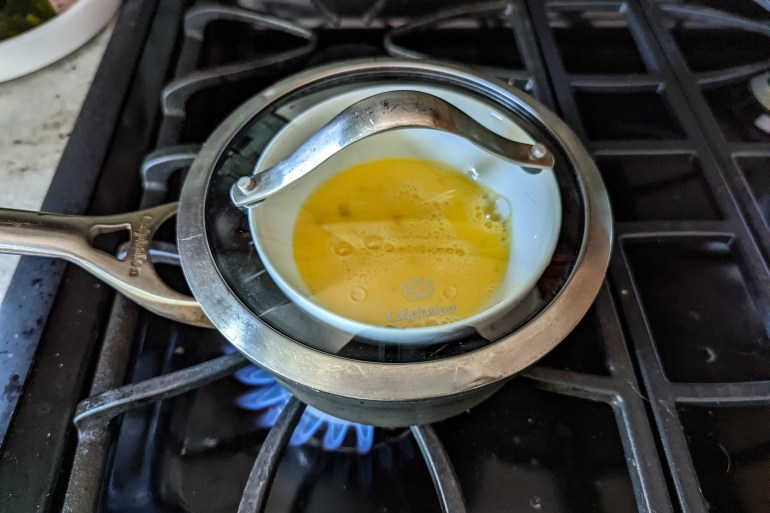
I had no compunctions about joking that the cooking gene skipped right over her and hopped on to my dad. I did it thoughtlessly, not paying enough attention to register her reaction, to know if she was hurt by my mean-spirited jabs about consistently overcooked noodles and repeat dishes. By my embarrassment for her thrown-together meals that were neither Chinese nor American. By my lack of appreciation for a tired, hard-working mom who was doing the best she could with what she had.
Steamed egg in the armoire
My mother didn’t buy a stitch of new clothing for herself until after all four of her children were out of the house – after college when my parents retired. She was a very beautiful woman but not a vain one and, as a family that often had to do without, we always came first. So in the drawers of the heavy wooden armoire in her bedroom, it wasn’t her clothing that was protected – it was loose photos snapped and developed through the years. On the shelves were photo albums, worn and faded, the adhesive that kept the transparent film in place lightly yellowing and barely hanging on.
It was in this pile of treasures that I found a little pink paper booklet cut to half-page sizes and comb-bound. Inside, a photocopied, typewritten table of contents listed the names of the students in my elementary school and their mothers’ contributions to what was likely a fundraising project for the school. Its laminated cover simply read: Class Recipes, above a clip-art illustration of a little bear.

And like the spoiled, ungrateful, and short-sighted child I was, I didn’t hesitate to tell her so.
I was in my early teens when I stumbled upon it, charmed, but also nervous. I remember a slight sense of dread as I ran my thumb down the list of cookies and casseroles and other “normal” American foods – food so perfectly, wonderfully ordinary to my mostly white classmates, especially compared to our “foreign” Chinese dishes, for which I was already bullied and made fun of. Insecure and fearful of derision as most adolescents are, I wondered with trepidation what ethnic monstrosity my mom contributed. I felt the weight of pity in my belly imagining the scrutiny and mockery the American mums would have of our alienness, knowing how “othered” my mother already was, shut out of school committees and social events.
Steamed Egg, read the line next to my name.
The dread intensified.
Fried or scrambled – that was what was acceptable, per my schoolmates. Hard-boiled was a hard no for its stinkiness, and the middle-class, middle-school palates of my peers were not mature enough for poached or runny yolks yet. Steamed egg? That was unheard of.
The recipe itself was innocuous. It took up less than a quarter of the half-page, a single quadrant in a dual column sheet. But still, I was embarrassed, my own insecurities about not fitting in triggered. It was too simple of a recipe to me, and it showcased my mother’s lack of culinary prowess while also highlighting a distinctly Chinese way of cooking.
Who steams an egg? I thought, my feet firmly in hypothetical xenophobic shoes, imagining the petty mockery of other mothers when the booklet was made six years earlier.
Aligning myself with them, in a desperate bid for superiority and separation, I immediately confronted my mum as she prepared lunch in the kitchen and asked her disdainfully, “Was this the best you could do?”
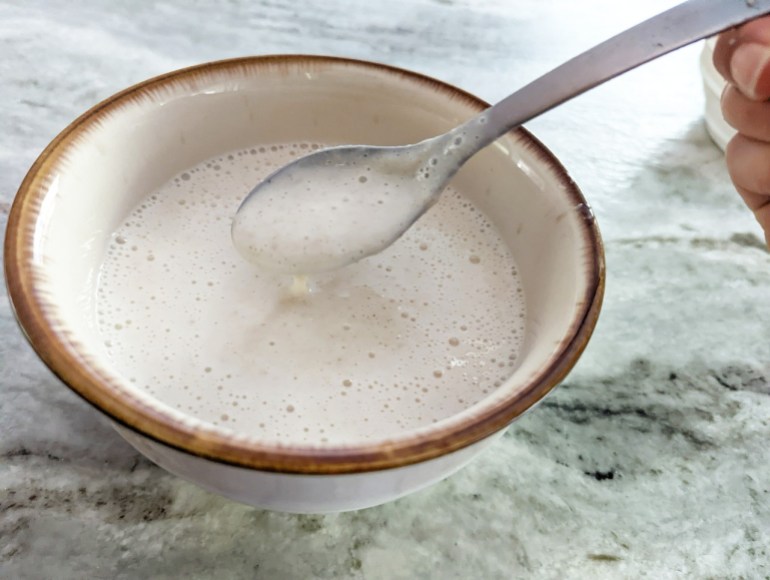
Oat porridge. Slurry, sludge
She called it “Oat Man Cereal” for the iconic Quaker man on the front of the oat canister, and always in a playful singsong tone to try to drum up excitement for a flavourless breakfast staple.
The overly enthusiastic announcement wasn’t for me, though. I loved the stuff. Rather, the performative cheer was for my younger sisters as she tried to make it sound fun. When she was very young, my baby sister would literally break out in tears while eating it – a dramatic response, but not one out of the pale for a child just barely school-age.
Yet, for its nutritive value, my mum still valiantly tried, extolling virtues through a bright smile as if she could emote a change of mind. “So gluey!” she’d exclaim.
“So slimy,” my sister would rebut through her sniffles.
I, on the other hand, loved its thick texture, how it lit me up from the belly to my brain, getting it warmed up for a day of school. My mother used to cook it on the stovetop in whole milk, then put it in the blender, piping hot. She’d take the plastic stopper off the lid, cover it with a kitchen rag to avoid the heat blowing off the top and push down the puree button, filling the kitchen with the roaring sound of motorised blades at seven in the morning until it reached the texture of baby food.
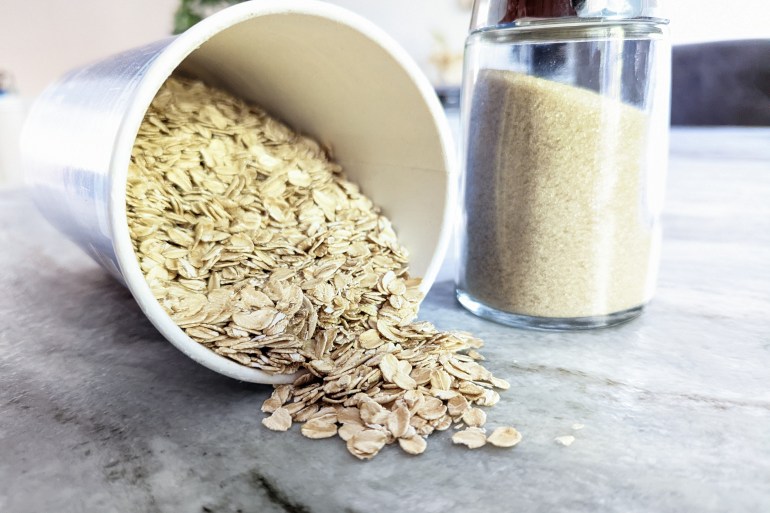
She’d pour it out into small bowls and let us add our own sweetener – plain white sugar spooned out of a plastic takeaway soup container, taken from our restaurant. I’d sprinkle it across the top of the oats that were quickly congealing in the cool morning air of those winter mornings before the heating kicked in. I’d stir slowly, enjoying the clear liquid tracks the dissolving sugar would make in the breaking, gelatinous sludge, cutting through tiny but still visible tan fibres of the grain in a swirl.
But it was two votes to my one and, overruled, my mother eventually gave up making it.
Years went by before I touched oatmeal again. It seemed like a whole laborious process and I felt bad asking my mom to go through it just for me. I could have made it myself, but I honestly couldn’t be bothered. Oatmeal simply wasn’t interesting enough to be worth all that work, having to get out a blender and clean it and its spatter, plus the glass-top stove I’d have to scrub scalded milk from when it inevitably boiled over.
It wasn’t until my late teens that I learned that it was actually supposed to be a much simpler dish – commonly served chewy, textured, and in clumps suspended in liquid.
What I do remember is feeling betrayed. This breakfast food that I thought I’d shared in common with my white schoolmates, this very American food, was a lie because my mother had managed to make it alien.
“Why did you puree it?” I asked. “It’s so much better like this, normal,” I said, my words pointing out again her weirdness, my tone accusing. “For so long, I didn’t know how to eat oatmeal because of you!”
“You wouldn’t eat the lumps when you were little,” she protested. “And I couldn’t get your sisters to like it.”
Softly, slightly defiantly, “I did it for you kids.”
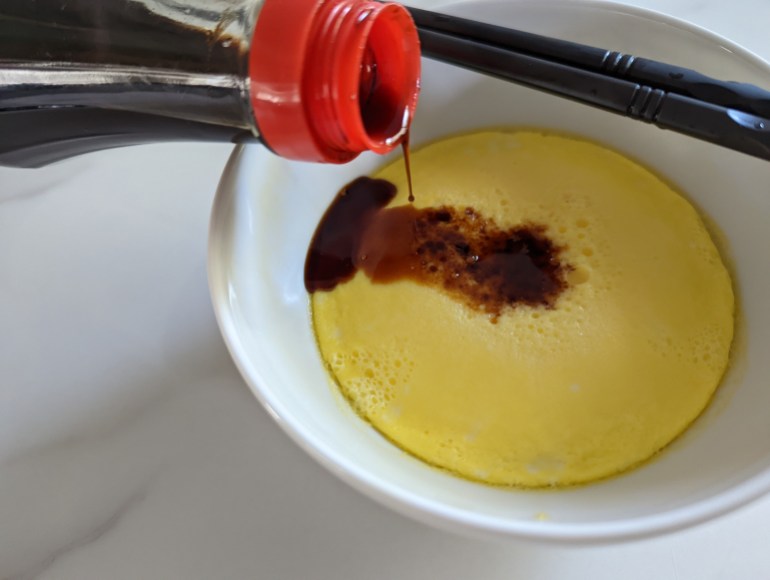
Oats, eggs, ghosts, and regrets
Today, Korean and Chinese steamed eggs are trending. Custardy, seasoned from the inside then again from the outside, they’re all over TikTok in their jiggly glory.
I can imagine my mum laughing, not vindictively but vindicated, saying to me, “See?!” as the social media-influenced attempt to learn to steam, burning their fingers with the inexperience of lifting hot porcelain bowls out of hot vapour baths.
I think about how she’d add Chinese black mushrooms to the eggs, or tiny shrimp that would crunch and sparkle with salt – enhancements she’d added as a footnote to her recipe. About how tough mine always came out, never achieving the silkiness she so carefully created. About how I can never replicate her more complexly flavoured variations, where she’d transform her simple steamed egg into what she’d call “meat pie”, pressing my dad’s strongly seasoned wonton meat into the bowl under the whipped egg mixture for an invention entirely her own.
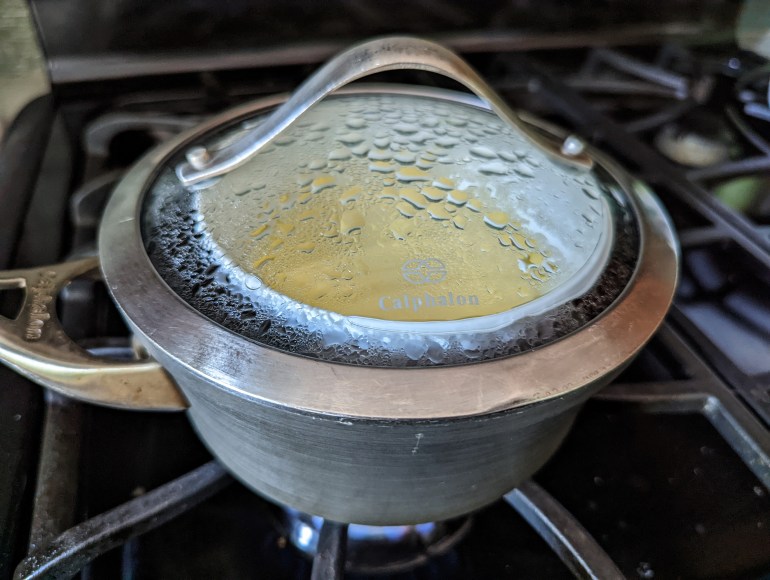
I think about how I will likely never try to make it just that way. They hurt too much, the memories, especially now that she is gone.
I think about how I do try to make oatmeal the way she did, and how hers is my favourite.
I’ve had oatmeal in Ireland with fresh cream and preserves, baked with orange peel and cranberries, slow-cooked with cinnamon apples and raisins. Yet it is my mother’s that I crave. It is my mother’s that I cannot duplicate. There’s something about the clean simplicity, the thick texture, the unabashed, generous hand she had with the milk, the fact that unlike me, she never, ever boiled it over or scalded it. I sometimes think about pureeing it, too. But then I don’t because my oats are steel-cut and expensive, and I am lazy.
I think about how my mother was not the chef in the family, but she was so much more than that. She was creative and quirky, thrifty and adaptable. Ahead of her time in some ways, as with the steamed egg trend, and living by the best advice she always gave us, always: to just “try your best.”
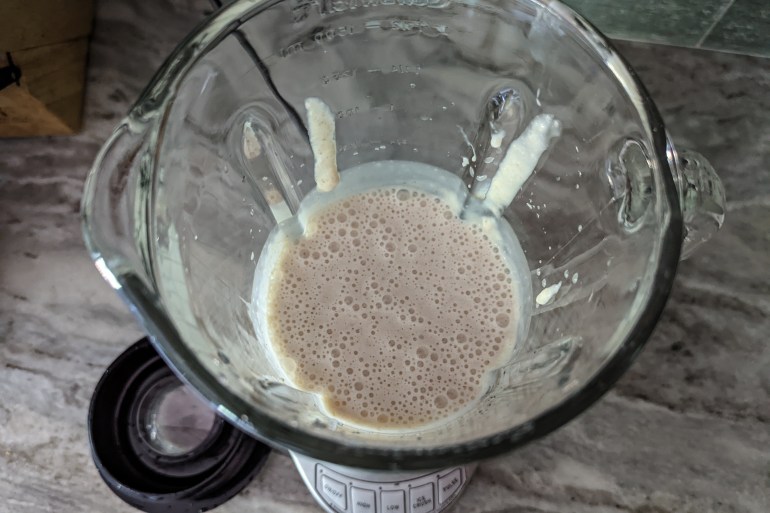
I know now that my resentfulness toward my mother’s perceived kitchen incompetence was a product of my being bullied at school for being different – an exhibition of the very common role reversal of becoming the bully for the momentary illusion of control. It was the desperate grasp of a child too selfish and immature to consider the toll on someone who loved them so dearly.
I’ve since realised that her inadequacy was all in my own head, all part of a quest for acceptance and assimilation. As an adult, I know now that I judged her harshly and unfairly because I was made to feel self-conscious about my cultural background by my peers and projected that angst onto her
She knew that, I think.
She must have. When I’d visit home and ask her to make me oatmeal and if she had meat for steamed egg meat pie. She had to have, because she never made apologies for her cooking. She just laughed good-naturedly and shrugged when things didn’t come out just right.
Even though her steamed eggs and oatmeal always did. Even though I now crave them for their simple warmth and comfort, for the fact that I can’t ever replicate them nor have I the emotional strength to make these dishes that bring forth so much regret.
So what if my mother was not the chef? It’s not like she was trying to be.
She was busy being everything else to us.